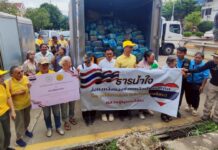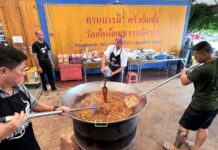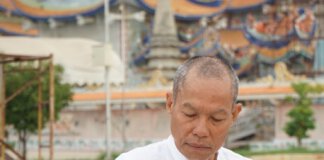มีอะไรอยู่ในพาหุง ๘ ห้อง (ตอนที่ ๒)
๒๘ สิงหาคม ๒๕๖๔
ทำไมโบราณาจารย์ท่านถึงได้ปลูกฝัง สั่งสอนให้ลูกหลานพยายามท่องจำให้คล่องปาก ขึ้นใจ
เราท่านทั้งหลายมาทำความเข้าใจในพรพาหุงทั้ง ๘ ห้องดูกันหน่อย
วันนี้ขอนำเสนอในห้องที่สอง ความว่า
มาราติเรกะมะภิยุชฌิตะสัพพะรัตติง
โฆรัมปะนาฬะวะกะมักขะมะถัทธะยักขัง
ขันตีสุทันตะวิธินา ชิตะวา มุนินโท
ตันเตชะสา ภะวะตุ เต ชะยะมังคะลานิ
พระจอมมุนีทรงเผชิญหน้ากับยักษ์ตนหนึ่งอันมีนามว่า อาฬวกยักษ์ ผู้มีจิตกระด้างหยาบช้า ดุร้ายโหดเหี้ยม
ผู้มากไปด้วยเพลิงโทสะ และความหลงผิด อวดอ้างตนว่าเป็นผู้มีฤทธิ์มาก สามารถเหาะเหินเดินอากาศ ชอบที่จะจับมนุษย์และสัตว์กินเป็นอาหาร
อาฬวกยักษ์ตนนี้ อาศัยอยู่ในวิมานที่ตั้งอยู่บนต้นไทรใหญ่ใกล้เมืองอาฬวี ยักษ์ตนนี้ยังได้รับพรจากท้าวเวสสุวรรณให้สามารถจับมนุษย์และสัตว์ที่เข้ามาในเขตถิ่นที่อยู่ของยักษ์กินได้
อยู่มาวันหนึ่ง พระราชาทรงนามว่า พระเจ้าอาฬวกะ ได้เสด็จออกล่าเนื้อพร้อมบริวาร จวบจนพระองค์ไล่ล่าเนื้อ หลงทางมายังถิ่นที่อยู่อาศัยของอาฬวกยักษ์ จึงถูกยักษ์นั้นจับตัวเอาไว้ด้วยมุ่งหมายจะกินเป็นอาหาร
พระราชาอาฬวกะ จึงร้องขอชีวิตด้วยการให้สัญญาว่าหากท่านจะกินข้าพเจ้า เสียแต่วันนี้ ท่านก็จะได้แค่กินอิ่มไปเพียงวันเดียว แต่หากท่านยอมอดวันนี้ ท่านจะมีมนุษย์กินอิ่มไปได้ทุกๆ วัน
อาฬวกยักษ์พอได้ฟังดังนั้นจึงถามกลับไปว่า “อย่างไรล่ะที่ท่านจะทำให้ข้ามีมนุษย์กินได้ทุกวัน”
อาฬวกะราชาจึงตอบว่า “หากวันนี้ท่านปล่อยข้า ข้าสัญญาว่าจะจัดส่งนักโทษที่ต้องโทษประหาร มาให้ท่านกินได้ทุกๆ วัน”
อาฬวกยักษ์ พอได้ฟังดังนั้นจึงครุ่นคิดว่า หากวันนี้เราจะยอมปล่อยตัวราชาผู้นี้ไป วันพรุ่งนี้เราจักได้มีมนุษย์กินได้ทุกวันดังที่ราชาสัญญาแก่เรา
คิดดังนี้แล้ว อาฬวกยักษ์จึงยินยอมปล่อยตัวองค์ราชาอาฬวกะไป
วันรุ่งขึ้น พระราชาอาฬวกะ จึงมีพระบัญชาให้พวกราชบุรุษคุมตัวนักโทษประหารมาส่งมอบให้เป็นอาหารแก่อาฬวกยักษ์ตามที่พระราชาได้ให้สัญญาไว้
เมื่ออาฬวกยักษ์ได้มนุษย์มาเป็นอาหาร ก็ใช้มืออันใหญ่รวบจัดมนุษย์นักโทษนั้นเคี้ยวกินเป็นอาหารอย่างง่ายดาย เป็นที่น่าสะพึงกลัวแก่พวกราชบุรุษที่ได้พบเห็นยิ่งนัก
ครั้นกลับไปยังบ้านเมืองแล้ว ก็นำเรื่องดังกล่าวไปพูดคุยบอกเล่ากันฟังในหมู่ชาวบ้าน จนผู้คนพากันหวาดกลัว ไม่มีใครกล้าที่จะกระทำผิดอาญาบ้านเมือง เพราะกลัวจะถูกจับตัวไปให้ยักษ์กิน
เหตุการณ์ผ่านพ้นไปเป็นเวลาแรมเดือน จนนักโทษในคุกหลวงหมดลง พระราชาอาฬวกะ จึงคิดอุบายที่จะนำคนให้ไปเป็นอาหารของยักษ์ ด้วยการนำเอาเงินและทองไปโปรยลงทั่วแผ่นดิน แล้วให้เจ้าหน้าที่คอยสุ่มแอบดูว่า ใครผู้ใดจะเก็บเอาเงินและทองนั้น แต่ก็หาได้มีมนุษย์ตนใดกล้าที่จะเก็บเอาเงินและทองนั้นไว้ไม่ ด้วยเพราะกลัวว่าจะถูกจับตัวเอาไปให้เป็นอาหารของยักษ์
เมื่อไม่มีคนที่จะส่งให้ยักษ์กิน พระราชาอาฬวกะ ก็เริ่มร้อนใจ กลัวว่ายักษ์จะมาเอาชีวิตตน เพราะผิดคำสัญญา องค์ราชาจึงได้ปรึกษากับสภาขุนนาง ได้รับคำแนะนำว่า บ้านไหนมีเด็กเกิดในวันข้างแรม ก็ให้นำตัวเด็กคนนั้นไปส่งให้เป็นอาหารยักษ์
พอข่าวนี้แพร่ออกไปทั่วเมือง หญิงมีครรภ์ท้องแก่ทั้งหลายได้พากันหวาดกลัว ต่างแอบอพยพหลบหนี ออกจากเมืองกันจนไม่มีเหลือผู้หญิงมีครรภ์อยู่เลย
แม้หญิงสาวก็ไม่กล้าที่จะมีคู่ เพราะกลัวว่าลูกของตนจะถูกจับไปเป็นอาหารของยักษ์
ความทุกข์ยากเดือดร้อนครั้งนี้แพร่สะพัดไปในหัวเมืองต่างๆ จึงทำให้ไม่มีใครผู้ใดจะเดินทางไปมาหาสู่แก่ชาวเมืองอาฬวีอีกเลย
กาลต่อมา เช้าวันหนึ่งพระบรมศาสดาทรงตรวจดูสรรพสัตว์ด้วยพระสัพพัญญุตญาณ ได้ทรงทราบว่า อาฬวกยักษ์ตนนี้ยังพอมีอุปนิสัยที่จะบรรลุพระอริยบุคคลเบื้องต้นได้ หลังจากที่ทรงทำภัตตกิจเช้าเป็นที่เรียบร้อยแล้ว จึงทรงเสด็จออกจากพระนครสาวัตถี ตรงไปยังนครอาฬวี ซึ่งมีระยะทางห่างถึง ๓๐ โยชน์
ช่วงบ่ายของวันเดียวกัน พระบรมศาสดาทรงเสด็จมาถึงตำบล บ้านที่มีต้นไทรใหญ่อันเป็นที่ตั้งวิมานของอาฬวกยักษ์ จึงทรงเสด็จพุทธดำเนินหยุดยืนอยู่หน้าวิมานของยักษ์
ในเวลานั้น ยามยักษ์ที่ทำหน้าที่เฝ้าประตูวิมานชื่อ คัทรภะ เห็นพระบรมศาสดา จึงตรงเข้ามาถวายบังคมทูลถามว่า ทรงมีธุระอันใดที่เสด็จมาอยู่หน้าวิมานยักษ์ใหญ่เช่นนี้
พระบรมศาสดาจึงทรงตรัสตอบว่า มีพระประสงค์จะพักแรมในที่นี้สักคืนหนึ่ง คัทรภยักษ์ จึงกราบทูลว่า เจ้าของวิมานนี้คือ อาฬวกยักษ์ เป็นยักษ์ที่โหดร้ายหยาบคายมาก ไม่ยอมไหว้ใครๆ แม้แต่บิดา มารดาของตน ไม่รู้จักสมณะชีพราหมณ์ และไม่เคารพพระรัตนตรัย พระพุทธองค์อาจมีอันตรายได้ แต่พระพุทธเจ้าก็ทรงออกพระโอษฐ์ขอพักอาศัยถึง ๓ ครั้ง ในที่สุดคัทรภยักษ์ก็อนุญาตให้พระพุทธองค์เข้าพักได้ แต่ขอให้ตนไปแจ้งให้อาฬวกยักษ์ทราบเสียก่อน ขณะที่คัทรภยักษ์ไปแจ้งให้อาฬวกยักษ์ได้ทราบ
ในเวลาเดียวกันนั้น ประตูวิมานของอาฬวกยักษ์ก็เปิดออกเอง พระพุทธเจ้าจึงเสด็จเข้าไปประทับนั่ง เปล่งพระรัศมีออกเป็นสีทองอยู่บนบัลลังก์ทิพย์ของ อาฬวกยักษ์ พวกนางสนมของอาฬวกยักษ์เห็นพระพุทธเจ้าเสด็จเข้าไปก็มีความยินดี พากันมาถวายบังคมแล้วนั่งฟังธรรม ด้านคัทรภยักษ์ เมื่อนำความไปแจ้ง อาฬวกยักษ์ให้ทราบ อาฬวกยักษ์ก็นิ่งไว้ ไม่ได้แสดงอาการเพราะอาย กลัวว่ายักษ์อื่นจะรู้ว่ามีสมณะเข้าไปอยู่ในที่ของตน
ขณะที่พระพุทธองค์ทรงแสดงธรรมโปรดนางสนมของพญายักษ์อยู่นั้น มียักษ์อีก ๒ ตน คือ สาตาคิรยักษ์ และเหมวตยักษ์ พร้อมด้วยบรริวาร พากันเหาะผ่านมาเพื่อจะไปประชุมที่ป่าหิมพานต์ แต่เมื่อมาถึงวิมานของอาฬวกยักษ์ ก็ไม่สามารถจะเหาะผ่านไปได้ พอทราบว่าพระพุทธองค์ประทับอยู่ จึงพากันแวะลงไปเฝ้าฟังธรรมก่อนจะเดินทางต่อ เมื่อไปถึงที่ประชุมยักษ์แล้ว สาตาคิรยักษ์ และเหมวตยักษ์ จึงแจ้งให้อาฬวกยักษ์ทราบว่า พระพุทธองค์ประทับอยู่ที่วิมานของเขา และแนะนำให้ไปเข้าเฝ้าพระพุทธองค์
เมื่อได้ทราบเช่นนั้นแล้ว อาฬวกยักษ์ก็โกรธ เป็นฟืนเป็นไฟ แม้สาตาคิรยักษ์ และเหมวตยักษ์ จะอธิบายว่าพระบรมศาสดา คือพระโพธิสัตว์ที่จุติจากดุสิตสวรรค์มาตรัสรู้ เพื่อสั่งสอนสรรพสัตว์ อันเทวดาทั้งหลายรู้ดี แต่อาฬวกยักษ์ไม่ยอมเชื่อฟัง ลุกขึ้นเอาเท้าซ้ายเหยียบพื้นศิลา เท้าขวาเหยียบยอดเขาไกรลาส ส่งเสียงร้องกาศชื่อของตนดังก้องไปทั่วชมพูทวีปด้วย
อิทธิฤทธิ์ของอาฬวกยักษ์นั้น อันเป็นเสียงหนึ่งในบรรดาเสียงดังพิเศษ ๔ อย่าง อันเป็นที่รู้กันทั่วชมพูทวีป คือ
๑. เสียงปุณณกยักษ์ส่งเสียงไชโย ในคราวชนะพนันพระเจ้าธนัญชัยโกรพยะ
๒. เสียงท้าวสักกะร้องประกาศขู่จะกินพุทธบริษัทผู้ใจบาป ที่ไม่ถือศีล ถือธรรม ครั้งปลายพุทธกาลของพระกัสสปะพุทธเจ้า
๓. เสียงพระเจ้ากุสราชร้องประกาศพระนามของพระองค์ในคราวที่พระองค์ ทรงพาพระนางปภาวะตีเสด็จขึ้นช้างออกจากพระนคร เมื่อนครกุสาวดี ถูกกษัตริย์ทั้ง ๗ ปิดล้อม
๔. เสียงอาฬวกยักษ์ที่ร้องตะโกนขู่ด้วยความอัดอั้นเคืองแค้น
ต่อมาอาฬวกยักษ์จึงได้บันดาลฝนห่าใหญ่ให้ตกลงมา ด้วยหวังใจว่าจะใช้น้ำท่วมพระพุทธเจ้าให้ตาย แต่แม้ว่าฝนจะตกรุนแรง จนแผ่นดินแตกเป็นช่องๆ แต่ฝนนั้นก็ไม่อาจเปียกจีวรของพระผู้มีพระภาคเจ้าได้เลย
อาฬวกยักษ์นั้นบันดาลฝนแผ่นหินให้ตกลงมาจากยอดเขาใหญ่ๆ พ่นควันลุกโพลงลงมาทางอากาศ แต่พอถึงพระพุทธเจ้าฝนหินก็กลายเป็นดอกไม้ทิพย์ไปทันที
อาฬวกยักษ์นั้นบันดาลฝนเครื่องประหาร เช่น ถ่านเพลิง ฝนขี้เถ้าร้อน ฝนทราย ให้ตกลงมา แต่ของเหล่านั้นตกลงมากลายเป็นของหอมอันเป็นทิพย์มาบูชาพระพุทธองค์ไปจนหมดสิ้น
อาฬวกยักษ์นั้น เมื่อไม่อาจทำอันตรายพระพุทธเจ้าได้ด้วยการบันดาลฝนต่างๆ จึงพายักษ์และภูตเข้าไปหา แต่ภูตเหล่านั้นก็ไม่อาจเข้าใกล้พระพุทธเจ้าได้ ดุจดังแมลงวันไม่อาจตอมก้อนเหล็กที่ลุกโพลงได้ฉันนั้น
ผ่านไปครึ่งคืน อาฬวกยักษ์คิดว่าจำเป็นต้องใช้อาวุธที่ร้ายแรงที่สุดของตน คือ ทุสสาวุธ ซึ่งมีอาณุภาพร้ายแรงดุจ วชิราวุธของพระอินทร์ คฑาวุธของท้าวเวสสุวรรณ และนัยนาวุธของพระยายมราช ทุสสาวุธนี้มีลักษณะเป็นผืนผ้า หากโยนขึ้นไปในอากาศ ก็จะทำให้ฝนแล้งถึง ๑๒ ปี ถ้าทิ้งลงบนพื้นดิน ต้นไม้ต่างๆก็จะไหม้ทำลายถึง ๑๒ ปี ถ้าทิ้งลงมหาสมุทร น้ำก็จะแห้งขอด ถ้าทิ้งลงบนภูเขา แม้เขาเนรุมาศก็จะระเบิดกระจัดกระจายเป็นผุยผง เมื่ออาฬวกยักษ์จะใช้ทุสสาวุธ บรรดาเทวดาทั่วหมื่นโลกธาตุก็ต่างมาชุมนุมกันเต็มไปหมด เพื่อรอดูพระพุทธบารมีขององค์พระบรมศาสดา ว่าจะปราบอาฬวกยักษ์ตนนี้ได้อย่างไร
อาฬวกยักษ์เหาะวนรอบพระพุทธเจ้าแล้วปล่อยทุสสาวุธไปในอากาศ ทุสสาวุธก็ลอยวนเสียดสีอากาศเสียงดังน่ากลัว ประดุจสายฟ้าผ่า แต่สุดท้ายก็ลอยตกลงมากลายเป็นผ้าเช็ดพระบาทที่แทบเท้าพระพุทธองค์
อาฬวกยักษ์เห็นดังนั้น คิดว่าอาวุธทั้งหมดไม่อาจทำอันตรายพระพุทธองค์ได้ จึงออกคำสั่งแก่พุทธองค์ว่า “สมณะ ท่านจงออกไปเดี๋ยวนี้” พระพุทธเจ้าทรงดำริว่าอาฬวกยักษ์ตนนี้เป็นผู้มีจิตใจแข็งกระด้าง หากตอบโต้ด้วยความแข็งกระด้าง ก็จะกลับมีจิตใจกระด้างขึ้นกว่าเก่า ดำริแล้วก็ทรงลุกขึ้นแล้วเสด็จออกจากวิมานยักษ์
อาฬวกยักษ์เห็นดังนั้นจิตใจก็อ่อนลงคิดว่าพระพุทธเจ้านี้ว่าง่าย แล้วออกคำสั่งต่อว่า “สมณะ ท่านจงเข้าไป” พระพุทธเจ้าก็ทรงเสด็จเข้าไปในวิมานยักษ์
อาฬวกยักษ์ได้ใจ ออกคำสั่งให้พระพุทธเจ้าเข้าๆออกๆ อยู่ถึง ๓ ครั้ง ซึ่งพระพุทธเจ้าก็ทรงทำตาม ประดุจการตามใจบุตรเมื่อร้องไห้ แต่เมื่อถึงครั้งที่ ๔ อาฬวกยักษ์สั่งว่า “สมณะ ท่านจงออกไป” ครั้งนี้พระพุทธเจ้าทรงดำรัสตอบว่า “เราไม่ออกไป ท่านจะทำอะไรก็ทำเถิด”
เมื่ออาฬวกยักษ์ถามเหตุผล พระพุทธเจ้าก็ตอบว่า “เมื่อเราเข้ามานั้น เราไม่ได้รับอณุญาตจากเจ้าของบ้าน เมื่อเจ้าให้ออกเราจึงออก แต่เมื่อเจ้าของบ้านอนุญาตให้เราเข้ามาแล้ว เหตุใดเราต้องออกไปอีก ดูก่อน อาฬวกยักษ์ เจ้าอนุญาตให้ใครเขาเข้ามาแล้วออกปากไล่เขาไปเช่นนี้ จักไม่เป็นการเสียมารยาทล่ะหรือ หากข่าวนี้แพร่สะพัดไปแล้วจะมีใครนับถือท่านเล่า”
อาฬวกยักษ์แปลกใจในพุทธปัญญา จึงเปลี่ยนเป็นทูลถามปัญหา โดยขู่ว่าหากพระองค์แก้ไม่ได้ เขาจะฉีกหัวใจ และจับร่างพระองค์เหวี่ยงข้ามแม่น้ำคงคา
แล้วอาฬวกยักษ์ก็ไปนำคำถามมาถามพระพุทธเจ้า โดยคำถามนี้มีที่มาจากในอดีตกาลในสมัยพระพุทธเจ้าองค์ก่อน คือ พระมหากัสสปะพุทธเจ้า บิดามารดาของอาฬวกยักษ์ ได้เคยถามปัญหาจากพระพุทธกัสสปะ และได้นำมาสั่งสอนอาฬวกยักษ์ แต่พอนานวันเข้าอาฬวกยักษ์ก็จำได้แต่คำถาม แต่ลืมคำตอบ ถามใครๆ ก็ไม่มีใครตอบได้ เพราะเป็นปัญหาที่ตอบได้เฉพาะพระพุทธเจ้า อาฬวกยักษ์จึงเขียนคำถามเก็บไว้ในวิมาน พระพุทธเจ้าก็ทรงแก้ปัญหาให้อาฬวกยักษ์เหมือนที่พระพุทธกัสสปะเคยแก้ไว้ ดังนี้
ปุจฉา : อะไรเป็นทรัพย์เครื่องปลื้มใจอันประเสริฐของคนในโลกนี้ อะไรที่บุคคลประพฤติดีแล้วนำความสุขมาให้ อะไรเป็นรสอันล้ำเลิศกว่ารสทั้งหลาย และเป็นอยู่อย่างไรที่นักปราชญ์ยกย่องว่าประเสริฐสุด
วิสัชนา : ศรัทธาเป็นทรัพย์อันประเสริฐของคนในโลก ธรรมอันบุคคลประพฤติดีแล้วนำความสุขมาให้ ความสัตย์เป็นรสอันล้ำเลิศกว่ารสทั้งหลาย และผู้อยู่ด้วยปัญญานักปราชญ์ทั้งหลายสรรเสริญว่าประเสริฐสุด
ปุจฉา : คนข้ามโอฆะได้อย่างไร ข้ามอรรณพได้อย่างไร ล่วงทุกข์ได้อย่างไร บริสุทธิ์ได้อย่างไร
วิสัชนา : คนข้ามโอฆะได้ด้วยศรัทธา ข้ามอรรณพได้ด้วยความไม่ประมาท ล่วงทุกข์ได้ด้วยความเพียร บริสุทธิ์ได้ด้วยปัญญา
ปุจฉา : คนมีปัญญาได้อย่างไร หาทรัพย์ได้อย่างไร หาชื่อเสียงได้อย่างไร ผูกมิตรได้อย่างไร และทำอย่างไรจึงจะไม่เศร้าโศกเมื่อไปสู่ภพหน้า
วิสัชนา : บุคคลเชื่อฟังธรรมย่อมได้ปัญญา บุคคลไม่ประมาท ฉลาด ไม่ทอดธุระ มีความเพียรย่อมหาทรัพย์ได้ บุคคลย่อมได้ชื่อเสียงเพราะความสัตย์ ผู้ให้ย่อมผูกมิตรไว้ได้ และบุคคลผู้มีธรรม ๔ ประการคือ สัจจะ ทมะ จาคะ และขันติ บุคคลละโลกนี้ไปแล้วย่อมไม่เศร้าโศก
ในที่สุดแห่งการทูลถามปัญหานี้ อาฬวกยักษ์ ผู้ส่งจิตใจไปตามพระธรรมเทศนา ก็สำเร็จเป็นพระโสดาบันในรุ่งแจ้งนั่นเอง เมื่ออาฬวกยักษ์สำเร็จเป็นพระโสดาบันแล้ว ก็เปล่งเสียงสาธุการ เป็นเวลาเดียวกับคนที่เมืองอาฬวี นำอาฬวกกุมารมามอบให้ อาฬวกยักษ์นั้นรับพระราชกุมารนั้นแล้วก็ประคองราชกุมารน้อมถวายแด่พระพุทธองค์ด้วยความเคารพ พระพุทธองค์ทรงรับพระราชกุมารนั้นมา ทรงประทานพรและมอบคืนให้คนของกษัตริย์เมืองอาฬวี พระราชกุมารนั้นจึงมีพระนามว่า หัตถกอาฬวกะ แล้วพระพุทธเจ้าก็เสด็จเข้าไปบิณฑบาตรในเมืองอาฬวี มีอาฬวกยักษ์เดินถือบาตร และสังฆาฏิตามมาส่งถึงครึ่งทางแล้วจึงกลับ หลังจากนั้นอาฬวกยักษ์ก็อยู่ในศีลธรรม เลิกกินเนื้อมนุษย์ตั้งแต่บัดนั้น
และหากจะมองในแง่ธรรมาธิษฐาน คือ การยกเอาธรรมเป็นที่ตั้ง เราท่านทั้งหลายจะเห็นว่า องค์พระบรมศาสดา ทรงใช้ความอ่อนโยน ชนะความแข็งกร้าว ทรงใช้ความอดทน ชนะความเย่อหยิ่งจองหอง บ้าอำนาจ และทรงใช้ปัญญา ชนะความยโส อวดดี
พุทธะอิสระ
————————————————-
มีอะไรอยู่ในพาหุง ๘ ห้อง (ตอนที่ ๑)
————————————————-
What is in the Bahum Prayer (Jayamangala Gatha – the eight victories and blessing)? (Part 2)
Why teachers of ancient times cultivated and taught children to memorize the Bahum Prayer (Jayamangala Gatha)?
We should try to understand the meaning of the Batum Prayer with its eight parts.
Today, I would like to present you the second part of this prayer.
Mārāti reka mabhi yujjhita sabba ratting
Ghorang panā-lavaka makkha mathaddha yakkhang
Khantī sudanta vidhinā jitavā Munindo
Tang tejasā bhavatu me (te) jaya mangalāni
The Buddha encountered a demon named Alavaka, whose mind was rough, ferocious, and cruel. The demon had full of rage and delusion. He boasted that he had lots of supernatural power. He could fly in the air and liked to feast on humans and animals’ flesh.
Alavaka lived in his own mansion on a big banyan tree near the city of Alavi. He was granted permission by King Vaisravaṇa that he could seize and devour anyone who came within the area of demons’ habitat.
One day, the King of Alavi and his ministers were hunting in the forest. They were lost and entered the area where Alavaka dwelt. Therefore, they were caught by the demon who wanted to eat them.
The king begged for his life by telling the demon that, “If you eat me today, you will be full only one day. But if you don’t eat me today, you will have humans to eat every day.
After the demon heard that, he asked the king, “How could I have humans to eat every day?”
The king replied that, “If you set me free today, I promise to provide you every day with the bodies of sentenced criminals as food”.
After the demon heard that, he thought that if he let the king leave today, from then on, he would have humans to eat every day according to the king’s promise.
Therefore, he set the king free.
The following day, the king told his attendants to take a prisoner from the death row to the demon, as promised.
Once the demon got that prisoner, he used his huge hand to grasp the body of that prisoner and devour him. The king’s attendants were extremely terrified to witness that.
After returning to the city, the king’s attendants told the story to villagers, which made people felt very scared. No one dared to commit any criminal, because they did not want to be eaten by the demon.
A month passed by. The prison finally ran out of criminal. The king conceived a trick to lure people to become demon’s preys. The king told his attendants to throw cash and gold all over the city and secretly watch who would pick up cash and gold. Nevertheless, nobody dared to pick up those cash and gold, because they were afraid to be caught and eaten by the demon.
When there was no criminal to send to the demon, the king was anxious that the demon would kill him because of broken promise. Thus, the king consulted with the house of lords who gave him advice that any house with a child born on a date of waning moon, would need to sacrifice that child to satiate the demon.
After the news spread all over the city, pregnant women were afraid and escaped out of the city, that there was no pregnant woman left. Even single women did not dare to get married, because they were afraid their children would be eaten by the demon. The suffering spread to other cities, that no one would dare to visit people in the city of Alavi.
In one morning, the Buddha, using his power of clairvoyance, saw that the demon had a potential to become enlightened and become a noble individual. After taking his morning meal, he left the city of Shravasti and hastened to the city of Alavi which was 30 Yot (approximately 480 kilometers) away.
In the afternoon of the same day, the Buddha arrived at the big banyan tree where Alavaka dwelled. The Buddha stopped at the entrance of the demon’s mansion.
At that time, the gatekeeper named Katarapa, saw the Buddha and approached the Buddha with a question, “Sir, how can I help you? Why are standing here in front of Alavaka’s mansion?”
Then, the Buddha asked the gatekeeper if he could spend a night there. Katarapa told the Buddha that the owner of the mansion was a very cruel demon who did not respect his own parents, monks, and the Triple Gems (Buddha, His Teachings, and Monks), and the Buddha could possibly be in danger. The Buddha asked him three times if he could stay there. Finally, Katarapa let the Buddha stay at the mansion, but he would have to inform Alavaka first. While Katarapa left to inform his master about the request, the Buddha went to sit on the throne of Alavaka. His body had golden aura. Wives of Alavaka felt very glad to see the Buddha. They went to pay respect to the Buddha and listened to his teaching. When Alavaka heard what was happening, Alavaka remained silent and did not say anything, because he was afraid that other demons would know that there was a priest inside his mansion.
While the Buddha was teaching Alavaka’s wives, the other two demons named Satakira and Hemvata and their followers were going for a meeting at the Himmapan Forest. When they arrived at the mansion of Alavaka, they could not fly further. Once they knew that the Buddha was there, they stopped by to listen to the Buddha’s teaching before traveling further. When Satarika and Hemvata arrived at the meeting of demons, they informed Alavaka that the Buddha was at his mansion and told him to pay homage to the Buddha.
After hearing that, Alavaka became furious, even though Satarika and Hemvata had explained that the Buddha was a Bodhisattva from the Dusit Heaven, born for enlightenment and teaching all living creatures. All devas and angels knew well, but Alavaka would not believe. Alavaka stood up and stamped his right foot on the Kelasa Mountain. Standing at the peak of the mountain, he shouted out his name loudly: “It’s me, Alavaka”. The whole world shook in fear at his shout. Alavaka’s loud shout was one of the following four extraordinary loud shout.
1. Punnaka Demon shouted loudly of his victory over the gambling against the King Thananchaikropaya.
2. Sakka King of Devas’s loud shout threatening to eat sinful, evil Buddhists during the late era of the Kassapa Buddha.
3. King Kusarach’s shout his name when he was taking Queen Papawadee riding on elephant out of Kusawadee City, when the city was blockaded by seven kings.
4. Alavaka Demon’s shout with wrath
With his extraordinary power, He made the rain fall heavily so that the Buddha would be drowned. Although the rainfall was so violent that the earth split, the rain could not touch the Buddha’s monk robe.
Furthermore, he caused the showers of stones from the big mountain to fall down upon the Buddha. But when all these arrived at the Buddha, they were turned into heavenly flowers.
Then, Alavaka created weapons, fire, hot ash, sand, and mud-flows to fall one after another on to the Buddha. But all these were turned into heavenly incense to worship to Buddha.
Alavaka could not harm the Buddha with storm. Then, Alavaka led a demon marching towards the Buddha, assuming various frightening forms. However, the demon-troops dared not go near the Buddha just as flies dare not rest on a red-hot iron rod.
After half of the night, Alavaka thought that he had to use his mostly dangerous weapon, Dussavuda, the fabulous white robe. Dussavuda is as powerful weapon as Vajiravudh of Indra, gadavudha of Vaisravaṇa, and Nayana-Avudha of the Yama, God of Death. Dussavuda was a robe, when flown into the air, it caused draught for twelve years. If it fell on earth, all trees will be burnt down for twelve years. If it was thrown into the ocean, water would run dry. If it was thrown at mountain, the mountain would break into dust. When Alavaka wanted to use Dussavuda, all devas in the universe came together to watch how the Buddha could conquer the demon.
The special weapon, Dussavuda, flew towards the Buddha like thunder and lightning amidst smoke and fire. Nevertheless, when it got near the Buddha it became an ordinary piece of rug. Alavaka could not understand why. Then an idea fleshed upon him that he failed on account of the power of loving-kindness which the Buddha radiated upon all beings. So he decided to destroy that power of the Buddha by accusing the Buddha thus: “Oh, Samana Gotama, why do you trespass on my residence without my permission? Get out of my residence now”.
Alavaka flew in circle around the Buddha and threw Dussavuda into the air. Dussavuda, flew towards the Buddha like thunder and lightning amidst smoke and fire. Nevertheless, when it got near the Buddha it became an ordinary piece of rug.
Alavaka thought that all kinds of weapon could not harm the Buddha. So, he ordered the Buddha, “Oh, Samana Gotama, get out of my residence now”. The Buddha, realizing that a violent person could never be admonished violently, He went out readily.
Seeing that, Alavaka became milder and gentler, because he thought that the Buddha could be persuaded easily. He again gave the order: “Samana Gotama, get into my residence again”. Again, the Buddha complied with the command. The Buddha went out of and entered the residence three times as commanded, similarly to the way father agreed to his crying child. But on the fourth time, when Alavaka ordered the Buddha, “Samana Gotama, get out of my residence now”, the Buddha replied to the demon, “No, I will not leave. Please do whatever you want to do.”
Then, Alvaka asked the Buddha for the reason. The Buddha replied, “When I came in, I had not received a permission from the owner. When you told me to leave, I left. But when the owner let me in, why I had to leave again. Look, Alavaka, you permitted someone in and drive him away, would not this be ill manner? If the news spread, who would respect you?”
Alavaka felt surprised by the Buddha’s wisdom. Then, Alavaka changed to ask the Buddha questions and threaten to tear the Buddha’s heart and throw the Buddha away to the other bank of the Ganga River, if he could not answer the questions.
The parents of Alavaka used to ask some questions to the Kassapa Buddha, and they passed this knowledge on to Alavaka. As time passed by, Alavaka could remember only the questions and forgot the answers. So, he wrote the questions so that he would not forget them. He asked several ascetics, but no one could answer the questions, because these were very profound questions, and they could be answered only by the Buddha. So, Alavaka wrote down the questions and kept in his mansion. The Buddha gave the same answers, as the Kassapa Buddha, as follows.
Question: “What is the best treasure in this world? What is the practice that brings happiness? What is the most delicious taste, and what kind of livelihood is the noblest?”
Answer: “In this world, to have faith in the Three Gems and in Karma and its results is the best treasure; the practice of the ten meritorious deeds can bring happiness; telling the truth is the most delicious taste; and living on the knowledge which brings forth benefits in the present the future existences is deemed as the noblest by sages”.
Question: “How could one cross the fourfold currents — sensual pleasures, state of existence, wrong views and ignorance? How could one cross the cycle of rebirths? How could one’s suffering quelled? How could one be purified?
Answer: “One can cross the fourfold currents — sensual pleasures, state of existence, wrong views and ignorance, by faith. One can cross the cycle of rebirths by caution and diligence. One’s suffering is quelled by perseverance. One can be purified by wisdom.”
Question: How could one gain wisdom, treasure, fame, and friendship? How does one not feel sorrowful in the next life?
Answer: One who listen a lot of Dharma will gain wisdom. One who is not careless, clever, and diligent will gain treasure. One gains reputation because of his honesty. One who gives will get friends. And those who possess four virtues: honesty, self-restraint, generosity, and patience, will not be sorrowful after death.
The Buddha proceeded to answer his other questions. While listening to the answers, which were given with compassion and loving-kindness, Alavaka became calm and gentle. Finally he was enlightened as a Stream-winner (Sotapanna).
Early in the next morning the King’s men came to the demon and handed the Prince to him. He was ashamed to accept the offer in the presence of the Buddha, so he offered the Prince to the Buddha. Later the Prince grew up and named Hatthalavaka. After that, the Buddha went to receive food offering in the Alavi City. Alavaka carried the Buddha’s alms-bowl and outer robe and waled half-way to see the Buddha off and left. Since then, Alavaka adhered to virtues and abstained from eating human flesh.
Looking at the virtue, you will see that the Buddha beat toughness with gentleness. The Buddha used patience to win over arrogance. And the Buddha win haughtiness by his wisdom.
Buddha Isara
August 28, 2021
————————————————-
What is in the Bahum Prayer (Jayamangala Gāthā – the eight victories and blessing)? Part 1







